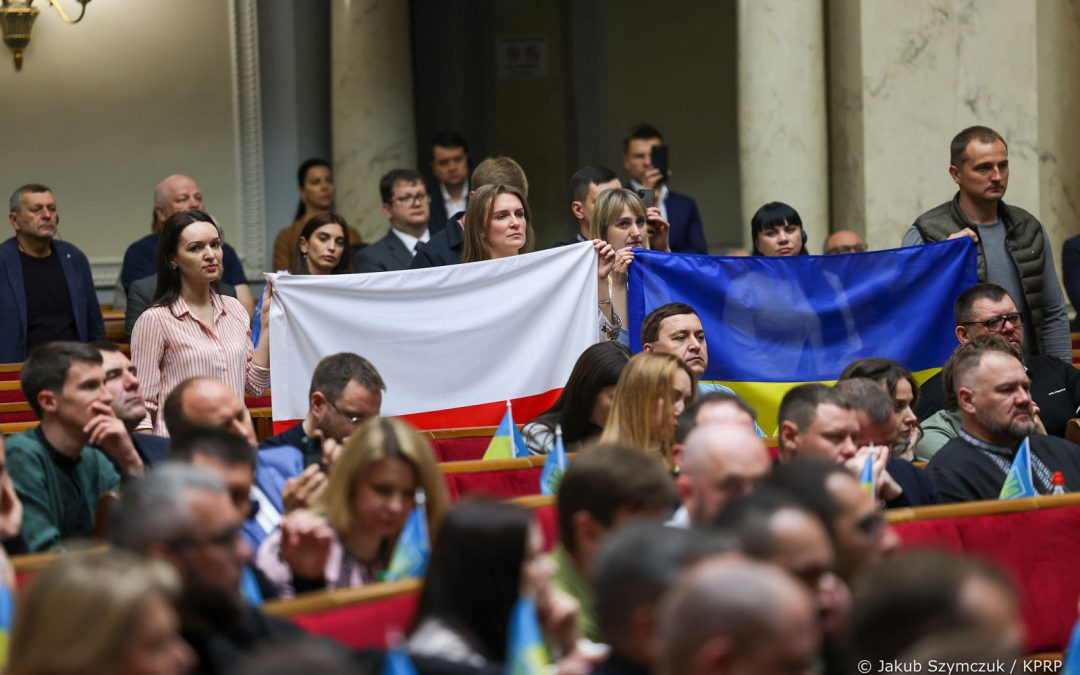Over 80% of Ukrainians have a good or very good opinion of Poles, and almost say three quarters say that their view of Poles has improved since Russia’s invasion, amid an outpouring of support for Ukraine from Poland’s government and society.
The study – conducted by Info Sapiens, a Ukrainian research institute, for the Mieroszewski Centre, a Polish public body – also asked Ukrainians about the two countries’ difficult World War Two history. It found views that the centre’s deputy director admits “may be disappointing for Poles”.
Ważne badanie. 83% Ukraińców żywi pozytywny stosunek do Polski i Polaków, a negatywny – poniżej 1% procentu. Takie wyniki przyniósł ogólnoukraiński sondaż opinii publicznej @MieroszewskiPL i #InfoSapiens Dziś, z okazji Dnia Niepodległości Ukrainy, częściowo ujawniamy jego wyniki. https://t.co/dRxL8aNvNJ
— Łukasz Adamski (@LukaszAdamskiPL) August 24, 2022
In the survey, almost half of respondents (46%) said their opinion of Poles now was “very good” and a further 37% said it was “good”. Meanwhile, 15% had a neutral view and less than 1% a negative one.
Some 73% of Ukrainians said their view of Poles had improved for the better, and only 1% that it had worsened, with 23% saying it had not changed. In comparison, just 29% said they now thought better of Germans, while 88% had a worse opinion of Russians.
Asked which word best described their view of Poles, the most popular answers were “neighbours” (54%), “allies” (52%) and “friends” (49%). Over a third (36%) would be interested in learning Polish if given the chance.
Jak Ukraińcy zmienili swoje zdanie o Polakach, Niemcach i Rosjanach po 24 lutego 2022? Szczególną uwagę zwraca ogromny przypływ sympatii do Polaków.
Więcej: https://t.co/iP5WHjkLuJ
Cały raport już we wrześniu!#RaportMieroszewskiego pic.twitter.com/bGwEJDy2nr— Centrum Mieroszewskiego (@MieroszewskiPL) August 24, 2022
The survey also asked about the history of the two countries, which has often been an area of tension.
During the Second World War, around 100,000 ethnic Polish civilians were killed by Ukrainian nationalists in an ethnic cleansing operation known as the Volhynia massacres. Before the war, ethnic Ukrainians in Poland had faced repression.
Asked about what role Poles had played in Ukraine’s history, 33% of respondents said it had been “mainly positive” while a further 38% said that it was “negative up to the Second World War and then mainly positive”. Only 8% answered “mainly negative”.
However, regarding the Volhynia massacres, only 5% of respondents agreed that it was ethnic cleaning carried out on the orders of the Ukrainian Insurgent Army (UPA). A further 9% described it as “the murder of Poles carried out by some UPA units against the orders of the UPA leadership”.
Meanwhile, 27% saw it as a reciprocal war between the Polish and Ukrainian underground armies that resulted in both Polish and Ukrainian civilian deaths. A further 9% saw it as reciprocal murder of Polish and Ukrainian peasants and 8% as an action by the Polish underground against Ukrainians, who had to defend themselves.
By contrast, in Poland a 2018 poll by SW Research for Rzeczpospolita found that 72% of Poles regard the massacres as genocide. Two years earlier, Poland’s parliament had passed a resolution recognising it as such.
In the new survey of Ukrainians, 24% of respondents said they would not accept Polish demands to exhume former Polish villages and erect memorials stating that inhabitants were killed by the UPA. Over half (53%), however, said they would agree as long as similar plaques were placed on the graves of Ukrainian victims of the Polish underground.
Łukasz Adamski, deputy director of the Mieroszewski Centre, noted that these results “may be disappointing for Poles”, as they indicate that most Ukrainians do not “believe what professional Polish and Western historians say” about the Volyhnia massacres. There is still “much to be done” on this issue, he told news website Interia.
However, Adamski believe that overall “the results of the survey are highly optimistic”. They “show that Ukrainians are extremely friendly towards Poles, and therefore confirm that there is fertile ground for intensifying relations between the two countries and nations in future”.
The Mieroszewski Centre (which was until this year known as the Centre for Polish-Russian Dialogue and Understanding) is a public institution working for dialogue with eastern European nations.
The survey was carried out between 11 and 15 August on a representative of 1,036 Ukrainian adults using Computer-Assisted Telephone Interviewing. The sample did not include Ukrainians who have left the country or those living in Crimea or other Russian-occupied areas not covered by Ukrainian mobile operators.
Main image credit: Jakub Szymczuk/KPRP

Ben Koschalka is a translator, lecturer, and senior editor at Notes from Poland. Originally from Britain, he has lived in Kraków since 2005.




















